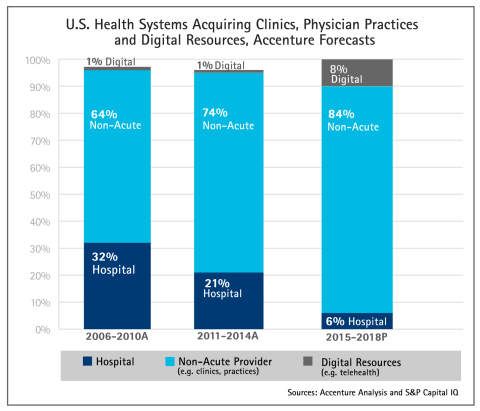CHICAGO--(BUSINESS WIRE)--Large U.S. health systems are buying clinics, physician practices and digital resources in search of growth opportunities in lieu of traditional acquisition of other hospitals, according to a new report from Accenture (NYSE:ACN).
Accenture’s report, which analyzed more than 1,500 healthcare provider acquisitions between 2006 and 2015, identified a surge in deal-making over that time, which is being driven by the need to gain economies of scale, shift from volume to value-based care, compete in local markets and expand digital health and healthcare IT capabilities. Accenture estimates that in the first five months of this year, healthcare providers set a year-to-date record in acquisition volume of $241 billion.
“To deal effectively with greater complexity, higher volumes and other changes resulting from increased acquisitions, industry providers will need to manage their businesses with the mindset of a portfolio manager,” said Kristin Ficery, managing director of health provider consulting at Accenture. “Rather than viewing deals as one-off opportunities, the best-prepared executives will systematically manage a potential deal as a product of the whole.”
As providers are seeking to diversify and differentiate, Accenture’s research found the shift toward vertical and digital acquisitions in healthcare will continue gaining momentum. The share of “vertical” acquisitions – in which health providers buy non-acute-care facilities, such as clinics or physician practices – will reach 84 percent of the total provider acquisition volume by 2018, up from 74 percent today. The share of “digital” acquisitions – purchases of health companies that focus on sensors, mobility, analytics or cloud (SMAC) capabilities, such as remote monitoring or tele-health–will expand by a multiple of eight, from 1 percent of overall acquisition volume in 2014 to 8 percent by 2018.
At the same time, Accenture found traditional acquisitions of hospitals by providers decreased from 32 percent to 21 percent between 2006 and 2014. The share of traditional horizontal acquisitions will shrink even more dramatically, from 21 percent in 2014 to 6 percent by 2018.
“There are no guarantees of success but a portfolio approach will improve the chances that the broader business survives and grows and a transaction generates the value that was intended,” added Ficery.
Methodology
Accenture analyzed healthcare provider acquisition data from S&P Capital IQ from 2006-2014. Data from more than 1,500 acquisitions were analyzed and categorized by type of provider organization acquired. Accenture performed historical and trend analysis to determine 2015-2018 forecast.
About Accenture
Accenture is a global management consulting, technology services and outsourcing company, with more than 336,000 people serving clients in more than 120 countries. Combining unparalleled experience, comprehensive capabilities across all industries and business functions, and extensive research on the world’s most successful companies, Accenture collaborates with clients to help them become high-performance businesses and governments. The company generated net revenues of US$30.0 billion for the fiscal year ended Aug. 31, 2014. Its home page is www.accenture.com.

